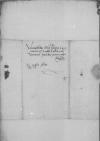Letter #4834
Ioannes DANTISCUS to Ermland (Warmia) ChapterHeilsberg (Lidzbark), 1542-04-21
English register: Dantiscus admonishes the Chapter not to tolerate the presence of the concubine of the recently reconciled apostate [Alexander Sculteti] in his domain. If Sculteti continues to persist in error, he will be punished according to canon law.
Manuscript sources:
| ||||||
Text & apparatus & commentary Plain text Text & commentary Text & apparatus
Venerabilibus Dominis
Venerabiles Domini, fratres sincere dilecti.
cf. Cic. Off. 1.81 Quamquam hoc animi, illud etiam ingenii magni est, praecipere cogitatione futura et aliquanto ante constituere, quid accidere possit in utramque partem et quid agendum sit, cum quid evenerit, nec committere, ut aliquando dicendum sit “non putaram”.; V. Max. 7.2.2 Scipio vero Africanus turpe esse aiebat in re militari dicere “non putaram”, videlicet quia explorato et excusso consilio quae ferro aguntur administrari oportere arbitrabatur. Summa ratione: inemendabilis est enim error, qui violentiae Martis committitur.; Sen. Dial. 4.31.4 Turpissimam aiebat Fabius imperatori excusationem esse “non putaui”, ego turpissimam homini puto. Omnia puta, exspecta ⌊Non esse sapientis fertur non putaramcf. Cic. Off. 1.81 Quamquam hoc animi, illud etiam ingenii magni est, praecipere cogitatione futura et aliquanto ante constituere, quid accidere possit in utramque partem et quid agendum sit, cum quid evenerit, nec committere, ut aliquando dicendum sit “non putaram”.; V. Max. 7.2.2 Scipio vero Africanus turpe esse aiebat in re militari dicere “non putaram”, videlicet quia explorato et excusso consilio quae ferro aguntur administrari oportere arbitrabatur. Summa ratione: inemendabilis est enim error, qui violentiae Martis committitur.; Sen. Dial. 4.31.4 Turpissimam aiebat Fabius imperatori excusationem esse “non putaui”, ego turpissimam homini puto. Omnia puta, exspecta ⌋. Hoc quidem ob nuper reconciliatum
Proinde Fraternitates Vestras religiose pieque hortamur, ne eam
Fraternitates Vestras feliciter valere optamus.

